How fit are you?
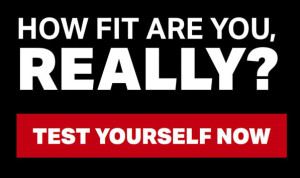 As part of T School, we focus on one the triads of total health each month. These trains are: Nutrition, the foundation of all health; Fitness the foundation of movement and functionality; and Mind Body Balance, the ability to create and sustain the practice of good habits for optimal health.
As part of T School, we focus on one the triads of total health each month. These trains are: Nutrition, the foundation of all health; Fitness the foundation of movement and functionality; and Mind Body Balance, the ability to create and sustain the practice of good habits for optimal health.
This month is Fitness Month. We’re celebrating that with our Free Mother’s Day Zumba and Hoop-lates Pilates in the Park this Sunday. It’s important to remember that fitness can be fun and we’re all about the fun at 1901.
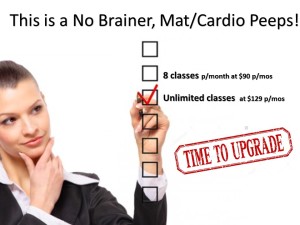 That’s evident by our brand new class schedule that begins next Monday. In addition to your favorites, we ‘be expanded our mat/cardio class options to include a brand new 29 minute Restorative Reformer workout (to
That’s evident by our brand new class schedule that begins next Monday. In addition to your favorites, we ‘be expanded our mat/cardio class options to include a brand new 29 minute Restorative Reformer workout (to
deliciously lengthen and strengthen your body) as well as a brand new 50 minute Sunday morning Pilates Circuit combining the best of equipment training with cardio intervals to provide just the right amount of confusion to provide the optimal training effect for your continued results. Click here to access our new schedule.
There’s simply NEVER been a BETTER time to be at 1901! We’ve just reduced our monthly unlimited mat/cardio class pass, too! Upgrade now from your 2x week pass for just $30 more for unlimited mat/cardio classes! Click here for details.
So really, how fit are you today?
 If you’re curious about your current fitness level, it might be fun to do the following four self assessments now at the beginning of the month, and then again after Memorial Day.
If you’re curious about your current fitness level, it might be fun to do the following four self assessments now at the beginning of the month, and then again after Memorial Day.
We encourage you to write your results down and then do them again weekly to measure your progress. Remember, what is measurable is manageable and a great way to keep it real.
One Minute Push Up Test
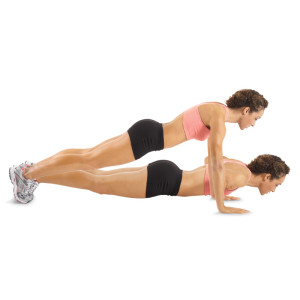 The push up test measures muscular strength and endurance, a better combination for testing than other tests like the one rep max. Those tests also require a lot of equipment (bench press or squat rack, barbells, and other weights). A timed push-up test, on the other hand, can be done anywhere.
The push up test measures muscular strength and endurance, a better combination for testing than other tests like the one rep max. Those tests also require a lot of equipment (bench press or squat rack, barbells, and other weights). A timed push-up test, on the other hand, can be done anywhere.
Equipment needed: A stop watch or timer that can measure one full minute; a friend to help keep count and time you (optional).
Goal: Do as many push ups as you can in one minute.
Execution: Men will assume a traditional push-up position and females can use the modified push-up position (on knees). When the push ups start, so does the clock! Press yourself up with arms fully extended and lower yourself back until your chest is three inches from the floor (but do not touch your body to the floor). Repeat as many times as you can in one minute. You may rest only in the “up” position if necessary.
What this measures: Strength and endurance in your chest, shoulders, and triceps.
Scoring: Here are the age-adjusted standards based on guidelines published by the American College of Sports Medicine (ACSM):
Ratings for Women (Modified Push Ups), based on Age
| 20-29 | 30-39 | 40-49 | 50-59 | 60+ | |
| Excellent | >48 | >39 | >34 | >29 | >19 |
| Good | 34-48 | 25-39 | 20-34 | 15-29 | 5-19 |
| Average | 17-33 | 12-24 | 8-19 | 6-14 | 3-4 |
| Poor | 6-16 | 4-11 | 3-7 | 2-5 | 1-2 |
| Very Poor | < 6 | < 4 | < 3 | < 2 | < 1 |
Ratings for Men (Full Push Ups), based on Age
| 20-29 | 30-39 | 40-49 | 50-59 | 60+ | |
| Excellent | > 54 | > 44 | > 39 | > 34 | > 29 |
| Good | 45-54 | 35-44 | 30-39 | 25-34 | 20-29 |
| Average | 35-44 | 24-34 | 20-29 | 15-24 | 10-19 |
| Poor | 20-34 | 15-24 | 12-19 | 8-14 | 5-9 |
| Very Poor | < 20 | < 15 | < 12 | < 8 | < 5 |
The Crunch Test
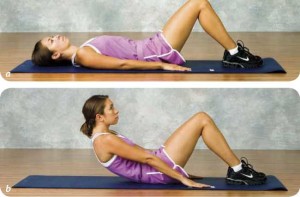 The Crunch Test, technically referred to as the “partial curl-up” test, measures abdominal strength and endurance, a combination that more truly reflects your fitness level than strength tests
The Crunch Test, technically referred to as the “partial curl-up” test, measures abdominal strength and endurance, a combination that more truly reflects your fitness level than strength tests![]() alone. This test is a better choice over the standard sit-ups because crunches are safer for the lower back and target the abs better. A timed crunch test can also be done anywhere.
alone. This test is a better choice over the standard sit-ups because crunches are safer for the lower back and target the abs better. A timed crunch test can also be done anywhere.
Equipment needed: A stop watch or timer that can measure one full minute; a ruler; a friend to help keep count and time you (optional).
Goal: Do as many crunches as you can in one minute.
Execution: Although this test involves regular crunches, it has some specific guidelines. Lie down on your back with your knees bent, feet flat on the floor and your heels about 18 inches away from your behind. Place your arms at your sides, palms down, fingertips next to your hips. Place a ruler next to your fingertips in this position and measure 6 inches further. You can put a piece of paper, the ruler itself, or a piece of tape at that 6-inch marker.
Keep your hands on the floor throughout the test. Just like abdominal crunches, engage the abs to lift your head, neck, and shoulder blades off the floor, but allow your fingertips to slide toward the 6-inch marker. Return to the starting position to complete one rep. Repeat this as many times as you can in 60 seconds, counting only the number of repetitions that your fingertips successfully reach the 6-inch marker. You may rest in the starting position (relaxed), but the clock continues to run.
What this measures: Strength and endurance in your abdominals.
Scoring: Here are the age-adjusted standards based on guidelines published by the American College of Sports Medicine (ACSM):
Ratings for Women, Based on Age
| Rating | < 35 years | 35-44 years | > 45 years |
| Excellent | 50 | 40 | 30 |
| Good | 40 | 25 | 15 |
| Marginal | 25 | 15 | 10 |
| Needs Work | 10 | 6 | 4 |
Ratings for Men, Based on Age
| Rating | < 35 years | 35-44 years | > 45 years |
| Excellent | 60 | 50 | 40 |
| Good | 45 | 40 | 25 |
| Marginal | 30 | 25 | 15 |
| Needs Work | 15 | 10 | 5 |
The 3 Minute Step Test
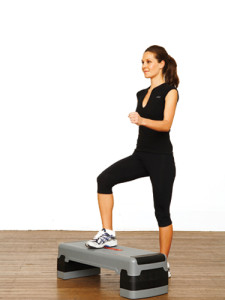 The 3-Minute Step Test measures your aerobic (cardiovascular) fitness level based on how quickly your heart rate
The 3-Minute Step Test measures your aerobic (cardiovascular) fitness level based on how quickly your heart rate![]() returns to normal after exercise.
returns to normal after exercise.
Equipment needed: Stopwatch or clock with a second hand; a friend to help you keep count; a 12-inch bench, box, or step; a metronome (if you don’t have one, use the free online version at www.MetronomeOnline.com)
Goal: Step on and off the bench for 3 minutes straight while keeping a consistent pace and then see how quickly your heart rate will come back down. (you can always use a step at the studio)
Execution: This test is based on a 12-inch step, so use one as close to 12 inches as possible, otherwise your results will be skewed. Set the metronome to 96 beats per minute and make sure you can hear the beat. Stand facing the step. When ready to begin, start the clock or stopwatch and march up and down on the step to the metronome beat (up, up, down, down) for 3 consecutive minutes. (You can rest if you need to, but remain standing.) When 3 minutes are up, stop immediately, sit down on the step, and count (or have a friend count) your pulse (use your wrist or neck) for one full minute.
What this measures: This test assesses your fitness level based on how quickly your heart rate recovers after exercise. The fitter you are, the quicker your heart rate will return to normal after exercise.
Scoring: Here are the age-adjusted standards based on guidelines published by YMCA.
Ratings for Women, Based on Age
| 18-25 | 26-35 | 36-45 | 46-55 | 56-65 | 65+ | |
| Excellent | 52-81 | 58-80 | 51-84 | 63-91 | 60-92 | 70-92 |
| Good | 85-93 | 85-92 | 89-96 | 95-101 | 97-103 | 96-101 |
| Above Average | 96-102 | 95-101 | 100-104 | 104-110 | 106-111 | 104-111 |
| Average | 104-110 | 104-110 | 107-112 | 113-118 | 113-118 | 116-121 |
| Below Average | 113-120 | 113-119 | 115-120 | 120-124 | 119-127 | 123-126 |
| Poor | 122-131 | 122-129 | 124-132 | 126-132 | 129-135 | 128-133 |
| Very Poor | 135-169 | 134-171 | 137-169 | 137-171 | 141-174 | 135-155 |
Ratings for Men, Based on Age
| 18-25 | 26-35 | 36-45 | 46-55 | 56-65 | 65+ | |
| Excellent | 50-76 | 51-76 | 49-76 | 56-82 | 60-77 | 59-81 |
| Good | 79-84 | 79-85 | 80-88 | 87-93 | 86-94 | 87-92 |
| Above Average | 88-93 | 88-94 | 92-88 | 95-101 | 97-100 | 94-102 |
| Average | 95-100 | 96-102 | 100-105 | 103-111 | 103-109 | 104-110 |
| Below Average | 102-107 | 104-110 | 108-113 | 113-119 | 111-117 | 114-118 |
| Poor | 111-119 | 114-121 | 116-124 | 121-126 | 119-128 | 121-126 |
| Very Poor | 124-157 | 126-161 | 130-163 | 131-159 | 131-154 | 130-151 |
The One Mile Walk Test
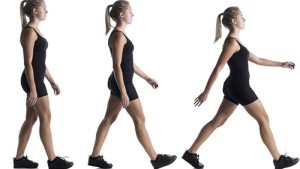 This 1-Mile Walking Test measures your aerobic (cardiovascular) fitness level based on how quickly you are able to walk a mile at a submaximal (moderate) exercise intensity.
This 1-Mile Walking Test measures your aerobic (cardiovascular) fitness level based on how quickly you are able to walk a mile at a submaximal (moderate) exercise intensity.
Equipment Needed: Comfortable clothing and sturdy walking or running shoes; a stopwatch or a clock with a second hand; a flat one-mile walking surface, such as a standard quarter-mile track (four laps equals one mile) or a flat road where you’ve measured the one-mile distance with your car’s odometer.
Goal: Walk one mile as quickly as possible.
Execution: We suggest that you DO NOT attempt this test until you are routinely walking for 15 to 20 minutes several times per week. Do not perform this test on a treadmill, as it will skew your results. Warm up by walking slowly for 3-5 minutes. When you are ready to begin, start the clock and begin walking as fast as you can while maintaining a steady pace. You can slow down and speed up as you wish, but the goal is to complete the mile as quickly as possible. Stop your watch or check your time at the end of the mile to the nearest second. When finished, keep walking for a few minutes to cool down. Follow up with a few stretches for your calves, low back and hamstrings.
Scoring: Here are the age-adjusted standards (listed in minutes and seconds) for men and women, which are based on information collected from the Cooper Institute, American Council on Exercise and other sources.
Ratings for Women, Based on Age
| Age | 20-29 | 30-39 | 40-49 | 50-59 | 60-69 | 70+ |
| Excellent | <13:12 | <13:42 | <14:12 | <14:42 | <15:06 | <18:18 |
| Good | 13:12-14:06 | 13:42-14:36 | 14:12-15:06 | 14:42-15:36 | 15:06-16:18 | 18:18-20:00 |
| Average | 14:07-15:06 | 14:37-15:36 | 15:07-16:06 | 15:37-17:00 | 16:19-17:30 | 20:01-21:48 |
| Fair | 15:07-16:30 | 15:37-17:00 | 16:07-17:30 | 17:01-18:06 | 17:31-19:12 | 21:49-24:06 |
| Poor | >16:30 | >17:00 | >17:30 | >18:06 | >19:12 | >24:06 |
Ratings for Men, Based on Age
| Age | 20-29 | 30-39 | 40-49 | 50-59 | 60-69 | 70+ |
| Excellent | <11:54 | <12:24 | <12:54 | <13:24 | <14:06 | <15:06 |
| Good | 11:54-13:00 | 12:24-13:30 | 12:54-14:00 | 13:24-14:24 | 14:06-15:12 | 15:06-15:48 |
| Average | 13:01-13:42 | 13:31-14:12 | 14:01-14:42 | 14:25-15:12 | 15:13-16:18 | 15:49-18:48 |
| Fair | 13:43-14:30 | 14:13-15:00 | 14:43-15:30 | 15:13-16:30 | 16:19-17:18 | 18:49-20:18 |
| Poor | >14:30 | >15:00 | >15:30 | >16:30 | >17:18 | >20:18 |
Let us help you improve your fitness scores…
For muscular strength and endurance and abdominal strength, check out our new SHRED I.T. high intensity interval class, our Upper Cut Toning workouts, any Pilates mat, chair or tower, or reformer based workouts and our brand new Pilates Body Blast Circuit class on Sundays at 10 am!
For Cardiovascular strength and endurance, get your booty up for our Wednesday 6 am Step n Sweat cardio class, our brand new Jump To It Cardio and Jump Cut 29 minute tramp and toning workouts and of course, Zumba, a terrific way to burn tons of calories and smile throughout.
For Body composition (the ratio of fat vs lean body mass in your body), sign up for our monthly assessments which measure your body fat percentage, girth measurements, photos and progress reports and graphs.
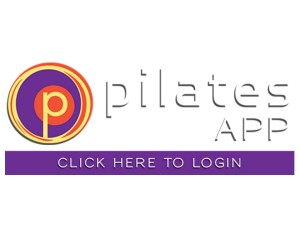 This service is FREE if you are a current T School client, and just $25
This service is FREE if you are a current T School client, and just $25
if you are not. This fee includes your private profile on our Pilates1901FitApp.
Our next monthly assessments will be on Saturday, May 21st between 10 am and noon by reservation. Sign up today!
Questions? Email us at info@pilates1901.com today! We’re here for you!
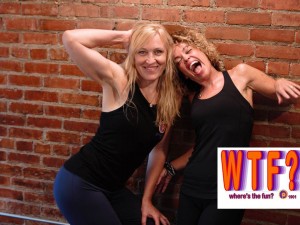
Leave a Reply